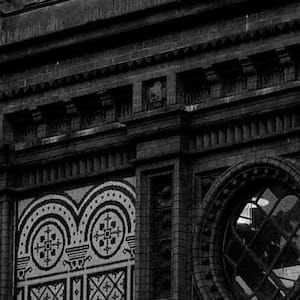have a face like the back end of a bus: Idiom Meaning and Origin
What does ‘have a face like the back end of a bus’ mean?
An idiom meaning someone has an extremely unattractive or unpleasant face, often used to give a brutally honest description of someone's appearance.

Idiom Explorer
The idiom "not a pretty sight" means that something or someone is unattractive or unpleasant to look at.
The idiom "just another pretty face" is used to describe someone who is attractive but lacks intelligence, skills, or substance. It implies that the person's appearance is their main or only attribute, often used in a dismissive or derogatory manner.
The idiom *in your face* means to confront someone with something aggressively or boldly, often to provoke a reaction. It implies direct and unapologetic behavior, disregarding social boundaries.
The idiom "in someone's face" means to confront or challenge someone in a direct and aggressive manner, often done to assert dominance or to express anger or frustration.
The idiom "hard on the eyes" is used to describe something that is visually unappealing or difficult to look at.
The idiom "give someone a bloody nose" means to physically or metaphorically harm or defeat someone, often resulting in humiliation or embarrassment to the person being targeted.
The idiom "frown at" means to display disapproval or express dislike towards someone or something through a facial expression of wrinkling or lowering one's brow.
The idiom "fresh-faced" refers to someone who has a youthful, healthy appearance, often with smooth and unlined skin.
An idiom used to express frustration, shock, or annoyance, often in an exasperated or pleading tone.
"Unveiling the Unfortunate Phenomenon"
The idiom "face that would stop a clock" is another vivid expression used to describe someone's unattractive appearance. Similar to "have a face like the back end of a bus," this idiom relies on a metaphorical comparison to convey its meaning. The phrase suggests that the person's face is so unattractive that it would "stop a clock," emphasizing their lack of beauty in a exaggerated and humorous way.
The origin of "face that would stop a clock" is also unclear, with no definitive information available about its historical context. However, like the previous idiom, it emerged in the early to mid-20th century in British English. This idiom highlights the unattractiveness of an individual's face by implying that it is so unpleasant that time itself would come to a halt upon seeing it.
Similar to the idiom "have a face like the back end of a bus," "not a pretty sight" is another phrase used to describe something unattractive or unpleasant. While the previous idioms focused on facial appearance, this idiom can be used to describe anything that is visually displeasing or distasteful.
"Not a pretty sight" is a versatile phrase that can be applied to various situations where something is unattractive, whether it's a person, an object, or a situation. It conveys a negative assessment of the visual aspect, emphasizing its lack of appeal or aesthetic value.
These idioms reflect the unique ways in which the English language incorporates vivid imagery and figurative language to convey meaning. They provide colorful expressions that go beyond literal descriptions and add richness to our communication. Whether used in conversation or writing, idioms like "have a face like the back end of a bus," "face that would stop a clock," and "not a pretty sight" offer creative ways to describe unattractive appearances and visually displeasing situations.
Example usage
Examples of how the idiom "have a face like the back end of a bus" can be used:
- She woke up with a terrible headache and looked in the mirror, realizing she had a face like the back end of a bus.
- After a long day at work, he came home exhausted and his tiredness was evident on his face - he had a face like the back end of a bus.
- When he saw his ex-girlfriend at the party, his face immediately turned sour as if he had a face like the back end of a bus.
More "Appearance" idioms



